|
|
|
Sort Order |
|
|
|
Items / Page
|
|
|
|
|
|
|
| Srl | Item |
| 1 |
ID:
188534
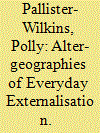

|
|
|
|
|
| Summary/Abstract |
In reflecting on the contributions to this Special Issue, I am struck by the rich breadth of empirical research on borderwork that is undertaken by a plethora of actors across numerous African sites and spaces. When asking a deceptively simple question – how is everyday borderwork experienced in (externalised) African spaces? – this Special Issue shows borders’ kaleidoscopic variation and the contentious politics of borderwork as is. This kaleidoscopic variation and contentious politics speak to earlier work in political geography and critical border studies around borderscapes, where borders, as the products of work, are considered not only multiple in terms of location and scale but to also be productive spaces and importantly sites of struggle (Brambilla Citation2015; Brambilla and Jones Citation2020).
|
|
|
|
|
|
|
|
|
|
|
|
|
|
|
|
| 2 |
ID:
188533


|
|
|
|
|
| Summary/Abstract |
As recent work in border studies has argued, EU-border externalisation is often achieved by exporting technocratic management templates and advanced surveillance technologies, prompting scholars to adopt the lens of biopolitics in studying borderwork. Outside of Europe, however, the paucity of resources and vastness of spaces mean that indigenous forms of agency continue to be a key factor of border governance. Focusing on everyday practices illuminated by ethnographic fieldwork, this article investigates EU border externalisation’s encounter with the Sahelian context. It argues that state and non-state actors form, deform and perform borders by extracting and capturing the material (economic) and immaterial (cognitive) resources that pass through liminal spaces. These dynamics shape a biopolitical economy of border control in which features of exceptionality, sovereignty and politics seem less compelling that those pertaining to the sphere of ordinary, hybridity and economy.
|
|
|
|
|
|
|
|
|
|
|
|
|
|
|
|
| 3 |
ID:
188526
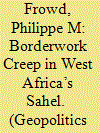

|
|
|
|
|
| Summary/Abstract |
This article argues that border management practices in the Sahel, strongly driven by European concerns and funding, are reaching into new geographic and policy areas. It introduces the concept of borderwork ‘creep’, to highlight how border management practices have, in the last 15 years, expanded along three axes. This term borrows from debates on ‘function creep’ in surveillance studies which have generally been focused on digital technologies in the global north. The first axis is a cartographic one, with borderwork functioning through a denial of cartographic limits to border security. Borderwork has crept inland, with security practices taking an expansive vision of the borderland and bringing controls to key inland nodes. The second is that of a cross-pollination of policy areas with a growing role for judicialised modes of justification for borderwork. The third relates to faith in technology, with new digital geographies making borderwork in the Sahel reliant on data handling and sharing. To make these arguments, the article draws on fieldwork since 2013 in Senegal, Mauritania, and Niger. By examining the breadth and expansion of borderwork in the Sahel, it contests visions that centre ‘Fortress Europe’ and instead highlights the multiple often overlapping global and local interests that expand borderwork in the Sahel.
|
|
|
|
|
|
|
|
|
|
|
|
|
|
|
|
| 4 |
ID:
188525


|
|
|
|
|
| Summary/Abstract |
This special issue of Geopolitics has been put together at the time of the mass demonstrations sparked by the murders of George Floyd, Breonna Taylor and other Black US citizens, as well as of acts of symbolic toppling of statues that glorify Europe’s dark colonial past. A slogan in bold bright blue letters on a protest banner at a demonstration in Italy in 2020 stood out and found its way into the media. ‘From the Mediterranean to Minneapolis, under water or under a knee, I can’t breathe’ (Sunderland Citation2020). It links racialised structural violence in the US with the European anti-migration context by making a clear reference to the European Union and its member states’ silent acceptance of the mass drownings of men, women and children attempting to cross the Mediterranean.1 In a context where the EU has abandoned maritime rescue missions while funding the Libyan coastguard’s pull-back operations, and where NGO humanitarian search and rescue operations are increasingly criminalised (Lloyd-Damnjanovic Citation2020) this is particularly topical.
|
|
|
|
|
|
|
|
|
|
|
|
|
|
|
|
| 5 |
ID:
188532
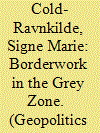

|
|
|
|
|
| Summary/Abstract |
EU externalised border control has become a bone of contention in EU–Malian relations. Based on fieldwork among Malian state officials, migrant associations and EU staff in Bamako, the article explores readmission agreements and border police collaboration. By examining the often-underestimated agency of national authorities, the article shows how EU border interventions aimed at producing control and confinement deep within the EU–African borderlands are contested and shaped by Malian state actors’ ‘borderwork’ (Rumford 2008). It argues that the contentious border politics produce ‘hidden acts’ through which moments of ‘sovereign exception’ (Agamben 1998) are produced in the ‘grey zone’ (Feldman 2019) of Europe’s externalised migration–security apparatus. Meanwhile, in the grey zone state actors’ everyday tactics of resistance are constitutive of new forms of sovereignty that is agency enabling.
|
|
|
|
|
|
|
|
|
|
|
|
|
|
|
|
| 6 |
ID:
188536


|
|
|
|
|
| Summary/Abstract |
Brexit has opened doors for renewed attention to contested, multi-scalar geopolitical forces grounded in everyday life in borderlands. In this paper, we aim to unravel ‘everyday Brexits’ in the Gibraltar–La Línea (Spain) borderlands. By studying the 2019 commemoration of the historic 1969 border closure, we concentrate on how local borderwork by residents is mobilised for bottom-up geopolitics in the context of Brexit negotiations. We use a conceptual approach that focuses on multiple layerings of the border and the selectivity of stakeholders to select among these layers to pursue their interests. Based on on-site observations, in-depth interviews, and informal conversations with residents and key actors of La Línea and Gibraltar, we argue that Brexit has increased the tension of already loaded core-periphery relations in Spain. Brexit does not represent a sudden disruption. Rather, we show how Brexit allowed the bottom-up geopolitical mobilisation of latent, strongly historically embedded and continuous cross-borders sentiments of residents. This mobilisation could potentially challenge local cross-border power relations. In the final analysis, we conclude that the bottom-up geopolitics of ‘ordinary’ residents through everyday bordering processes is central to geopolitics research, including with regard to Brexit and in particular for non-British geographies affected by Brexit.
|
|
|
|
|
|
|
|
|
|
|
|
|
|
|
|
| 7 |
ID:
188535


|
|
|
|
|
| Summary/Abstract |
The incipient crisis of the British state, which seems so apparent in ‘Brexit’, the move towards Scottish Independence, and the succession of minority governments, ought to be understood as a historical conjuncture. This conjuncture has entailed a profound reconfiguration of the social relations that constitute the British state-territory in the context of the world-system, making of it something as geographical as it is historical. Understanding this reconfiguration in novel, innovative, critical, productive or even sublative ways seems therefore to be a priority in the study of post-Brexit British politics and global political economy. Furthermore, as ‘Brexit’ has become the dominant narrativization of the objective conditions and subjective perceptions of this crisis, a convincing counter-narrative must be conceived for critical thinking and praxis. In the struggle over how to define our crisis in the British state, and drawing upon Critical Urban Theory, World-System Analysis, and poststructuralist political thought, the paper introduces the concept of the axiomatic city-state. This concept offers not merely an alternative empirical characterisation of the reconfigured British state, but a means of conceptualising broader transformations across the world-system at large. More importantly, it suggests a politically potent means for exploring critical vocabularies, strategies, and perhaps organization into the near future.
|
|
|
|
|
|
|
|
|
|
|
|
|
|
|
|
| 8 |
ID:
188529


|
|
|
|
|
| Summary/Abstract |
In the last 30 years Europe has attempted to strengthen its territorial borders with Africa through new migration governance practices. This article takes its point of departure in recent mass expulsions of Malian migrants from Algeria to reception centres in Niger to analyse the interlinked processes of deportation from North Africa to Mali and the increased dissatisfaction among the deportees ‘assisted’ by EU funded return and reintegration programmes in Mali. Through the analytical lens of the ‘anti-politics machine’ (Ferguson 1996), the article argues that the attempts to transform European borderwork practices into a ‘softer’ and ‘more humanist’ approach to migration management create new, contested, border zones aiming to obstruct African migrants’ mobility. The article shows how these new, EU-driven, migration management regimes, which are increasingly disconnected from local politics and mobility practices, spur contestations in Sahelian countries of origin, transit and reception. Thereby, the article provides insights into the unintended effects of how EU return governance is implemented, who it benefits, and who it leaves behind.
|
|
|
|
|
|
|
|
|
|
|
|
|
|
|
|
| 9 |
ID:
188538


|
|
|
|
|
| Summary/Abstract |
Drawing on analytic frameworks from feminist IR’s interrogation of fear in geopolitics and approaches rooted in the popular culture-world politics (PCWP) continuum, this article examines the ways in which the television series Counterpart (STARZ, 2017–2019) presaged a world defined by a novel form of ideological xenophobia and apolitical anthropophobia at the global level. As a premier example of immersive geopolitical television, the series examines diplomacy, biopolitics, and everyday attitudes to international relations via a screened imaginary that very much resembles our so-called ‘real world’ in the midst of the COVID–19 pandemic, while also auguring the likely reality to come. As I argue, our ‘new normal’ parallels many of the ‘other-worldly’ geopolitical codes and visions presented in Counterpart, thus explaining renewed interest in the series since early 2020. Focusing on the policing of bodies and borders in the time of COVID–19, I examine the series’ discursive and visual world-building against various ‘real-world’ governmental and societal responses to the ‘virus’. This is done through the lens of a new, global geopolitical thinking that is founded in the fear of (other) humans who are/might be (un)knowing carriers of the virus. Using Counterpart as a tool to think with, I attempt to bind geopolitics – an imagined/imaginary system of power relations based on limits and control – to anxieties triggered by the wide-ranging and uncontrollable flows of the novel coronavirus.
|
|
|
|
|
|
|
|
|
|
|
|
|
|
|
|
| 10 |
ID:
188527


|
|
|
|
|
| Summary/Abstract |
This article unpacks how state-led borderwork from above is dynamically and creatively negotiated and navigated from below by migrants and smugglers. It identifies certain everyday borderwork assemblages and describes the struggles that produce social and material infrastructure and geographical reconfigurations of mobility. The empirical material presented in this study is drawn from legal and policy reviews, life-story interviews with return migrants and key informant interviews with refugees, smugglers and migration-governing actors. In the Horn of Africa in recent years, Ethiopia has become a major sending and transit country of migrants and asylum-seekers. This development has generated both internal political challenges, as well as ΕU pressure on the Ethiopian government to introduce legislative and organisational structures to control clandestine migratory exits from and refugee transitions through Ethiopia. In exchange, the EU extends various promises to provide, for example, development aid and economic cooperation. However, the external pressure calling for stricter border controls and Ethiopia’s tighter migration laws have not stopped clandestine migration and refugee transits, nor have they facilitated safe and orderly migration, as promised. The article argues that migrants, their families and brokers continuously struggle and develop new strategies to redirect and spatially reconfigure migratory departures, despite the new restrictions. These are manifested in Ethiopia by the emergence of dynamic forms of clandestine migration pathways and complex smuggling arrangements facilitating migration to the Middle East and southern Africa.
|
|
|
|
|
|
|
|
|
|
|
|
|
|
|
|
| 11 |
ID:
188531


|
|
|
|
|
| Summary/Abstract |
In the ongoing global ‘war on migration’, no character has been more vilified than the ‘human smuggler’. Images of unscrupulous men taking advantage of innocent people flood the media and political discourse. Morocco, with its strategic geopolitical position as a main gateway between Africa and Europe, is no exception in this regard. In this article, I examine how the smuggler has come centre stage in the borderwork around the Europe–Morocco frontier. The concept of borderwork has gained traction in recent scholarship as a way of describing the complicated and rapidly changing empirical complexity of the creation and control of borders. This article further develops this notion, focusing on three intertwined aspects of the borderwork complex: policies, policing and practices of migrant smuggling. Rather than providing counter-arguments to the evil smuggler narrative (a task that has been admirably accomplished by many scholars) I here take an interest in the different intersecting forms of moral labour that go into anti-smuggling policies, local policing of migrants and practices of migrant smuggling, and make a preliminary case for the concept of moral borderwork. This concept allows us to consider how social concerns are raised, reproduced and handled in the borderwork complex. Based on long-term ethnographic fieldwork, the point of departure for this article is a particular moment in time during the summer and autumn of 2018 in Morocco, where black migrants were violently arrested and expelled in large numbers from the northern part of the country.
|
|
|
|
|
|
|
|
|
|
|
|
|
|
|
|
| 12 |
ID:
188537
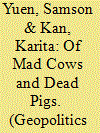

|
|
|
|
|
| Summary/Abstract |
The globalisation of food and agricultural trade has brought issues of food safety and biosecurity to the centre of geopolitical research. This paper explores the relationship between food risks and sovereignty practices, a topic that has received relatively scant attention in the scholarship. Going beyond conventional conceptualisations of sovereignty as an external-legal notion that is delimited to the realm of ‘high politics’ in international relations, this paper points to how it is also expressed and negotiated in quotidian practices of food import and consumption, and how this has contributed to the politicisation of food safety. Focusing on the case of Taiwan, a de facto island state with contested sovereignty status, and comparing the food safety discourses that arose during the outbreaks of Mad Cow Disease and African Swine Fever, we argue that food risks provide opportunities for social and political actors to participate in the everyday construction of sovereignty. While the Taiwanese government’s handling of the Mad Cow Disease shows it to be ultimately constrained by the geopolitical reality of fragile sovereignty, the outbreak of African Swine Fever enabled it to legitimise the securitisation of borders and bolster its legitimacy by staging collective defensive actions against perceived external risks. By drawing attention to how sovereignty is produced and performed through practice, this paper further advances recent discussions of sovereignty as a dynamic, social process.
|
|
|
|
|
|
|
|
|
|
|
|
|
|
|
|
| 13 |
ID:
188539


|
|
|
|
|
| Summary/Abstract |
In Edward Snowden’s surveillance revelations in 2013, online news media had an essential role in constructing discourse on mass surveillance, because sensitive documents were leaked straight to the press. To understand the role of online news in unfolding geopolitical discourses, this discourse analysis examined popular American and British online news reports at the time. The discourse analysis focused on selectivity, priming, and metaphors, while integrating notions on geopolitical code to understand whether online news mirrored the two involved governments’ justifications of surveillance practices. The analysis demonstrated selectivity in which victims of surveillance got attention, and online news tended to prime opinions critical of the surveillance. The justifications of the governments were communicated, but often refuted by other sources quoted in the same stories. Journalists used critical metaphors to convey the scope of the surveillance practices to readers. The findings highlight the role of online news in unfolding discourse of novel geopolitical affairs.
|
|
|
|
|
|
|
|
|
|
|
|
|
|
|
|
| 14 |
ID:
188528
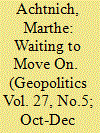

|
|
|
|
|
| Summary/Abstract |
Migrants’ mobilities in the fragmented state context of Libya are shaped by different dynamics of waiting. These dynamics emerge through intersections between transnational and local bordering practices. Examining the temporal effects of borderwork ethnographically by focusing on the lives of migrants who attempt to move on by boat to Europe, this article goes beyond depictions of waiting as an empty lived experience of time, to locate it within wider migration and mobility economies in borderlands. Migrants’ time is reproduced through intimate practices of care and labour and the ways in which they intermesh with a clandestine and often predatory economy where state and criminal actors profit from mobile lives. Focusing on migrants’ lived experiences of waiting to move on in contexts of fragmented state authority like Libya allows us to challenge fixed understandings of temporality as well as state-linked borderwork and its effects in Europe’s wider borderlands.
|
|
|
|
|
|
|
|
|
|
|
|
|
|
|
|
| 15 |
ID:
188530


|
|
|
|
|
| Summary/Abstract |
European-funded information and awareness-raising campaigns aimed at fighting migrant smuggling and discouraging African youth from migrating have become increasingly important aspects of European borderwork. To grasp the effects of such borderwork in Africa, this article pays attention to how affect and emotions are used in migration awareness campaigns and how local communities respond. An ethnographic exploration of one recent campaign in Senegal offers insight into a particular, European-driven form of affective borderwork. Such ‘aspiration management’ (Carling and Collins 2018) works to instil a sense in would-be Senegalese migrants that their hopes of migration to Europe are both dangerous and futile. I argue that affective borderwork works at a different level than other border activities connected to legal and physical migration control. By cultivating particular emotions and morally-embedded geographies, these campaigns promote an inner, self-regulating border in the minds and bodies of people. In these campaigns, which are crafted at the intersection of humanitarian principles of care and border control efforts, return migrants become key messengers.
|
|
|
|
|
|
|
|
|
|
|
|
|
|
|
|
|
|
|
|
|